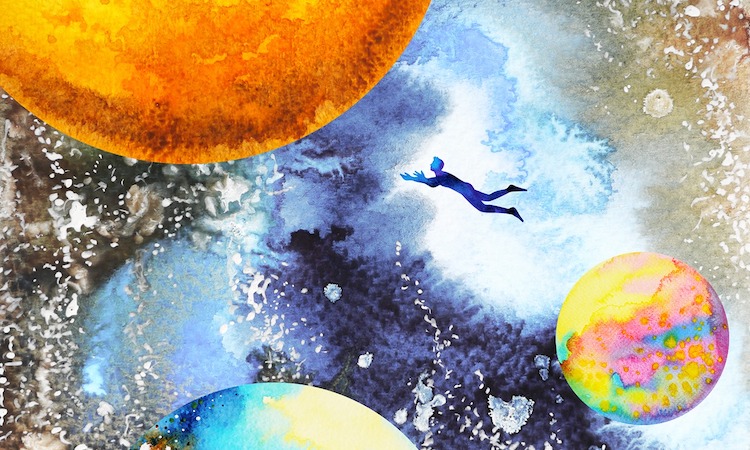Loving the Body of God
By Allegra Lovejoy | Апр 18, 2021

The Srimad Bhagavatam depicts the universe as the body of God. “This vast universe is distinctly the body of the Supreme: all matter; all energy; all phenomena of past, present, and future.”[1] Outer space constitutes His eye sockets, these scriptures say. The power of sight constitutes His eyes. The mountains are the stacks of His bones. All the trees on Earth are the hairs on His body.
Descriptions like this are offered within the Bhagavatam as a meditative practice. Yet they go beyond imagination. Vaisnava theology affirms that everything, seen and unseen, is a manifestation of the Supreme. While some aspects of theology are difficult to connect with, the universal manifestation is more accessible than we might think. It’s tangible. When was the last time you felt awe or wonder at a natural phenomenon? When you summited a mountain and looked out over the vista spreading below? When you picked fresh fruit from your garden? When you met a new baby for the first time? When a child held your hand?
“All beautiful and glorious creation springs from but a spark of My splendor,” Sri Krishna says in the Gita.[2] Wonder leads us to love. Whether or not you consciously link God with the wonder of creation, spend enough time experiencing wonder and you’ll begin to love the Earth.
The Vaisnava tradition teaches that love isn’t just a feeling. Love is made real through serving what we love. When loving service is oriented towards the Divine, it’s called бхакти. This is the Vaisnava devotional path. But don’t think that бхакти only happens in a prayer room. The Divine is present everywhere and in everyone’s hearts. A loving orientation and a willingness to serve – anywhere, everywhere – is how we become transformed. This is love as a way of being in the world. This is “making love a verb.”
How do we practically do this? It’s relatively easy to understand how to express love for one’s child, parent, or close friends and family. It’s harder to understand how to express love for a whole community, for a nation, or the planet. It can begin in small ways: visiting a grieving person, voting, picking up litter. As one practices acts of love, new insights and opportunities will arise. Continuing on this path can lead to a profound transformation into an instrument of service. The most difficult step is overcoming the paralysis of helplessness – and to begin.
We’re living in what feels to many of like an unprecedented era of violence. The threats to people, animals, and the Earth feel endless. It’s almost easier to tune out – to ignore the violence and cruelty all around and remain in a spiritual bubble. But Vaisnava scriptures are clear that this is not the appropriate path. The entire Mahabharata is dedicated to exploring ethical action in impossible situations. The conclusion of the Gita – the heart of the Mahabharata – is to “act anyway,” even if defeat feels certain. The Gita calls this practice akarma-yoga: action without attachment to results.
Acting out our love doesn’t just benefit those we serve or the planet. It also benefits us. Most people struggle with the same qualities that cause the senseless violence against people and planet. Atyahara is a term for this sickness of the heart: an addiction to collecting or consuming more than we really need. Prayasa: working hard to achieve things that are difficult to obtain. Aham-mameti: all this is mine, and I deserve more.
Acting to nurture or protect those we love, without expecting to save the world by doing it, works on these qualities within ourselves. Selflessness is the antidote to selfishness. Restoring damaged parts of the Earth is the antidote to mindless consumption. Helping a neighbor is the antidote to bias and internalized superiority.
Love transforms. How wonderful is this Divine manifestation! The antidotes we need exist right alongside the violence from which we suffer.
Allegra Lovejoy is a graduate student in religion and ecology at Yale Divinity School and a co-founder of the New York-based Sacred Ecology Forum.
[1] ŚB 2.1.24
[2] BG 10.41















